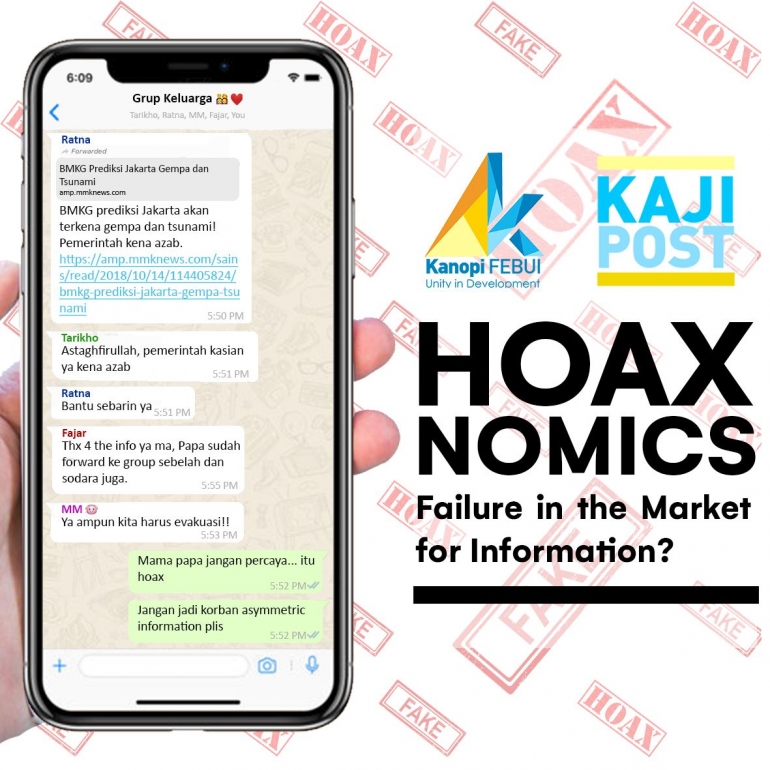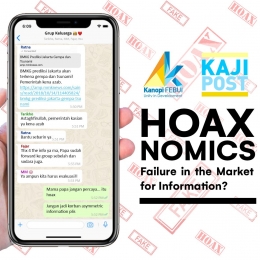The case of Ratna Sarumpaet's sensational lie reminds us that we live in a world where imagined stories could deceive even authority figures and be exploited as political ammunitions. We should not forget, however, that hoaxes are not just the occasional lies uttered by opportunistic public figures; we now have a whole industry that makes money from fabricating and spreading disinformation.
In addition to its more obvious political and psychological dimensions, the phenomenon of hoaxes could be examined through economics as well. If we see hoaxes as a product in the market of information, then we can apply economic theories to gain a more analytical understanding of the phenomenon and perhaps derive effective solutions.
Hoax--used interchangeably with fake news in this writing--refers to information that is deliberately fabricated or manipulated, either by the original source or the reporting media, for a particular gain. An industrial example would be those produced in Veles, a Macedonian town where teenagers were employed to write fake pro-Trump news that attract American readers, earning them thousands of euros from advertising revenue.
The definition would also include Indonesian buzzer teams posting fake political news in Jakarta's last gubernatorial election, financed by shadowy figures. This writing is going to focus on hoaxes that are objectively wrong (in reality, there are many news that have no verifiable truth, as well as those based on facts but are accompanied by questionable opinions or are presented with misleading languages).
Hoax, as with any other thing that has a market, could be explained with the tool of supply and demand. From the supply side, producers of hoax consider a cost-benefit analysis where they compare the benefits, which are monetary (Mb) and non-monetary (NMb), with the costs, which include monetary costs (Mc) and expected cost of punishment. The expected cost of punishment is the product of opportunity cost of punishment (Pc), probability of arrest (Parr) and probability of conviction (Pcon), these costs being perceived instead of actual. Producers would create and post fake news when:

To make a hoax viral, all it takes is some forwarding and netizens, or even automated bots, will do the rest. As for the cost of punishment (Opun), this should have increased as governments begin cracking down on hoax. For example, Indonesian authorities have stressed that spreaders of hoax could be punished with a 6 years sentence and a 1 million rupiah fine. However, this would be offset by the low perceived probabilities of arrest and conviction, remembering that most casual hoax posters go unpunished.
On the other hand, there are high benefits of posting hoax, which relate to the demand side. Monetary benefits come from advertising revenue, which is usually generated from the number of clicks on the hoax news site. Meanwhile, non-monetary benefits refer to political power or personal satisfaction gained from spreading a particular fake news, such as fear-mongering to influence voters. Both of these benefits are contingent on people's reception towards these fake news. The depressing fact is that hoaxes that align with biases and inflame emotions drive traffic more than truth, hence more profitable. This is confirmed by a study from MIT, which found that false news on Twitter reached more people and diffused faster than the truth. People are simply susceptible to believe and spread fake news, and the underlying reason is more psychological than economic.
Part of it could still be explained with attention economics, a concept first articulated by nobel laurate Herbert Simons. Attention economics explains that information is somewhat inversely related with attention. With more pieces of information available, people devote less to each. In this digital era, information is so abundant that attention has become scarcer.
This is dangerous because attention is needed to process information, including verifying a piece of fake news. While it does not require sophistication to debunk most potential hoaxes, a resource needed to do that---attention---is scarcer. A study found that the majority of people now share articles without reading beyond the headline.
Another important explanation behind the incentive to produce hoax is asymmetric information. As modelled by Allcott and Dentzkow in their paper, consumers of news derive utility from two channels: firstly, from knowing the truth and basing their action upon it, and secondly, from hearing news that confirm their prior beliefs. News producers could choose between credible reporting (which would primarily benefit consumers through the first channel) or posting confirmatory news (second channel).











